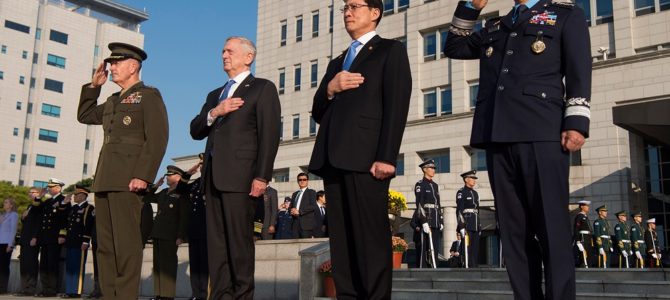
In the weeks since President Donald Trump and North Korean leader Kim Jong-un concluded their second summit in Hanoi, Vietnam, the Trump administration has reverted to Washington’s old, failed playbook: maximalist demands with no tradeoffs.
By obsessing over an unrealistic, up-front denuclearization deal with North Korea, the president and his advisers are turning down a dead end road. If that’s their policy, it is going to fail. When it does, the administration should not overreact and launch an unprovoked military strike on North Korea.
Steven Biegun, the U.S. special envoy to the North Korea talks, addressed a nuclear conference in Washington last week. While insisting the administration’s policy has not changed, Biegun spent most of his time on stage taking a hard line on the negotiations, essentially daring Kim Jong-un to walk away.
“We are not going to do denuclearization incrementally,” Biegun told the crowd—nor will any sanctions be lifted until the denuclearization process its complete. If denuclearization has any hope of succeeding, it must be an eventual goal rather than an up-front demand. No progress on any matter will be made otherwise.
What Biegun described as a new approach was actually a continuation of the same North Korea policy that has failed miserably over the last quarter-century: It is detached from reality and is designed to end this diplomatic process, not advance it. The obsession with the impossible—the complete and immediate nuclear disarmament of North Korea—comes at the expense of other positive outcomes that are actually attainable, from establishing a peace and security regime on the Korean Peninsula to getting U.S.-North Korea relations on more solid ground.
The scheme Biegun outlined this week will run into a buzzsaw of opposition because the North Koreans simply don’t trust U.S. promises. Unless the sequence is corrected—contain; engage; transform; and eventually, potentially denuclearize—President Trump’s year-long diplomatic process with Kim will fall apart.
While the collapse of current negotiations between Washington and Pyongyang would be disappointing, it should not lead to a disastrous war on the Korean Peninsula. The White House should rule out the military option and instead live with the status quo, which works to the United States’ favor: conventional and nuclear deterrence, the bedrock of U.S. security policy.
Diplomacy is an ongoing, never-ending process that should absolutely continue, but we are likely to see a return to the mutual deterrence dynamic that has largely defined the actions of both Washington and Pyongyang since the Kim regime conducted its first underground nuclear test more than a decade ago.
Over the past year of discussions with the North, the “fire and fury” rhetoric of 2017 has been toned down considerably and the possibility of overheated rhetoric leading to a completely unnecessary escalation has decreased exponentially. There is no reason the temperature should revert back to boiling if (and likely when) the current diplomatic process stalls.
The reality is, while the status quo is not ideal, it is far better than any other alternative. The United States is the lone global superpower and can certainly coexist with North Korea—a poor, weak, and desperate state living in a tough neighborhood and surrounded by far more prosperous and powerful neighbors.
Kim Jong-un may rule with brutality and violence, but there is no evidence to suggest he is irrational, suicidal, or aggressively courting a conflict. Like his father and grandfather before him, Kim is concerned with preserving his regime, maintaining his iron grip on the Workers Party, and ruling over his poverty-stricken country without the threat of a foreign invasion looming over his head. Nothing in Kim Jong-un’s eight years in power supports the idea of him going off the reservation and making the kinds of foolish decisions that could cost him his life.
Kim can be deterred and indeed has been ever since he took over the job from his father. As long as Trump does not overreact or listen to the interventionists in Washington and within his own administration who appear eager to unleash another unnecessary war, the United States can contain and deter North Korea indefinitely.
The United States should keep calm; sustain open lines of communication in order to keep miscalculations to an absolute minimum; and ignore the more hawkish corners of the foreign policy establishment who advocate for military adventurism.
While the world hopes President Trump will be able to strike an agreement with Kim on a cap and rollback of North Korea’s weapons, immediate denuclearization has always been an unrealistic goal. If the Trump administration gives up on diplomacy to solidify peace and open North Korea—and instead opts for the failed Washington playbook advocated by John Bolton—even denuclearization over the long-term goes from unrealistic to essentially impossible.
Fortunately, the U.S. military has enough conventional and nuclear firepower to protect the American people a million times over. U.S. policymakers can keep the American people safe even if Washington fumbles this historic opportunity to open North Korea and establish a more durable bilateral relationship.
Daniel R. DePetris is a fellow at Defense Priorities.









